- Home
- Patrick O'Brian
The Surgeon's Mate Page 13
The Surgeon's Mate Read online
Page 13
In spite of their mutual esteem, even their mutual affection, there was a slight awkwardness for a moment; but then, in an entirely different tone, Blaine broke the silence by saying, 'And yet even though the purpose of your voyage is entirely innocent, as of course it will be, might not there be some danger of your being recognized? You have done them great damage, and it would not be wise to place any very great reliance on a safe-conduct: not many men concerned with intelligence possess your scruples.'
'I have considered that, but it appears to me that at present the danger is negligible. The only Frenchmen who knew me for certain, by name and by appearance, were Dubreuil and Pontet-Canet; and as you know, both are dead. Their followers, who might possibly have some vague notion of my identity, are still in America; and even in the most unlikely event of their having been recalled at once, our brave packet made such an extraordinarily rapid passage that they cannot be in France until several weeks after my return to England.'
'That is true,' said Blaine.
'Furthermore,' said Stephen, 'I also look upon this journey as a kind of insurance: if any suspicions attach to my name, they are likely to be done away with by a public assertion of my scientific role—and I think I may venture to say without excessive vanity, that no man in Europe knows more of the anatomy of Pezophaps solitarius—and by my placing myself in the enemy's power, in the lion's mouth, of my own free will, and by my conscious innocence of any evil intent.'
'True again,' said Sir Joseph. 'And I have no doubt that your paper on the solitaire will make a great deal of noise, establishing you, if that were necessary, as the foremost authority on the subject. Still, I shall be glad to have you back as soon as may be, before there is the least possibility of any agent's return from America. And in any case I dare say you would like to go without delay. Brisk action is called for. Should you wish me to take the necessary steps for official permission, and for transport? We have a cartel sailing on the twelfth, which should answer very well.'
'If you please,' said Stephen. 'And since you are so very kind, I will allow myself to make two other requests.'
'I am delighted to hear it,' said Sir Joseph. 'There is little enough that you have ever allowed us to do for you; and what with the Leopard and now this Boston coup, we are so very much in your debt.'
Stephen bowed, hesitated for a moment, and said, 'The first concerns Mrs Villiers. As you will have seen from my report, it was largely by her means that I acquired these papers: yet at the same time she has remained in ignorance of my connection with the Department. For obvious reasons she accompanied me in the packet. But since she is technically an enemy alien she was detained on our arrival.'
'Yes?' said Sir Joseph, his head on one side.
'As you may remember,' said Stephen deliberately, 'the last time we spoke of her you were not altogether happy in your mind about her relationship with Mrs Wogan.'
'I remember,' said Sir Joseph. 'And I remember the lady too. I remember her perfectly. I had the pleasure of meeting her at Lady Jersey's, and again at the Pavilion. But if I do not mistake, you were no easier in your mind than I, at the time of her sudden departure for the States.'
'I was not, and I am very happy indeed to say that I was wholly wrong. Her loyalty to this country was entirely unaffected by her passing connexion with Mr Johnson, or by any papers she may have signed. That I will guarantee unconditionally. My request is that she may be released.'
'Very well,' said Sir Joseph, writing on a slip of paper. 'I shall attend to it myself: there will be no difficulty. The lady may set her heart at rest.' He paused a moment, but finding that Stephen did not intend to go any farther he continued, 'You mentioned a second request, I believe?'
'So I did, too. But this is a purely personal matter; it has nothing to do with the Department. I have a friend, a sea-officer, who was on shore for a while between commands and who succeeded in getting himself into very deep waters there. During a prolonged absence the water grew deeper still, and now I am very much afraid that it may close over his head, unless expert legal advice can extricate him. May I therefore beg you to tell me the name of the most eminent lawyer now in practice?'
'Would you be prepared to let me know the nature of your friend's trouble? Upon that depends the kind of adviser I should recommend. For a dispute over prize-money, it would be Harding, of course, unless he already acts for the other side; for criminal conversation or anything in the matrimonial line, for example, no doubt he should consult Hicks.'
'I will lay the case before you, as far as I understand it. My friend fell into the hands of a projector, a man more modest than the usual run, since he promised to turn my friend's lead not into gold but only into silver—there are disused lead-mines on my friend's estate. He was delighted with the scheme, delighted with the man, and in his simplicity he signed papers without reading them.'
'Signed papers without reading them?' cried Sir Joseph.
'I am afraid so. He had been appointed to a ship. It seems that he did not wish to lose the tide.'
'Good God! Yet really I should not be surprised: the imbecility of your sailor ashore passes all belief. I have seen countless examples of it, in all ranks, even in very able men, capable of leading a fleet and of conducting difficult diplomatic negotiations with real finesse. Only last week a distinguished officer I know assigned his half-pay for a lump sum: with this sum in his pocket in the form of negotiable bills he walks into a coffee-house. There he falls into conversation with a stranger: the stranger proposes an infallible scheme for multiplying capital by seven and a quarter without the slightest risk: the officer hands over his bills, and only when the stranger has been gone for some time does he realize that he does not even know the fellow's name, far less his dwelling-place. But to return to your unhappy friend: has he any clear notion of the import of these papers?'
'He fears that one may have been a power of attorney: though on the other hand he had already given his wife just such a document. But at all events, on his return he found that the projector, the thaumaturge, had plunged into wild expense, carrying out vast operations, even digging the traditional canal.'
'Yes, yes, of course, the canal,' said Sir Joseph, and Stephen, seeing the knowing look in his eye, said, 'It would be idle to pretend that I am not speaking of Jack Aubrey. I dare say you have seen the monstrous ditch in Hampshire?'
'I have, indeed,' said Sir Joseph. 'It has caused a deal of comment.'
'And that is not all. This reptile Kimber, for Kimber is the projector's name, now conceals himself behind a cloud of confederates, or rather of accomplices, to whom he has conveyed his ambiguous powers. Some of them are lawyers of the vilest kind, and they threaten proceedings. I am exceedingly concerned for Aubrey. I am very much attached to him and to his wife, and as you know I am under very great obligations to him.'
'You have nearly always sailed with him, I recall.'
'Ever since I took to the sea: and what is more, what is infinitely more, he plucked me from the hands of the French when I was taken at Mahon—a brilliant raid, carried out at great personal risk.'
'Certainly he has every claim on my gratitude,' said Sir Joseph. 'I have never met the gentleman, though you have often mentioned him. I know him by reputation, of course: a most dashing resourceful commander, the very type of fighting captain. Lord Keith thought very highly of him. And very fortunate by sea: indeed, they call him Lucky Jack Aubrey in the service. He must have made a vast deal of money at Reunion and the Ile de France. How such a man, whose parts enable him to bring a long and difficult campaign to a successful conclusion, can play ducks and drakes with his hard-earned fortune, launching blindfold into chimerical schemes, signing unread documents, trusting his fellow-men, is beyond my comprehension.' Sir Joseph shook his head, trying to enter into the mind of one who trusted his fellow-men without long and repeated proof of their integrity: he could not manage it, and he went on, 'Lucky at sea, perhaps: less so by land. He was certainly not at all fortunate in his choic
e of a father. Have you met General Aubrey, Maturin?'
'I have, alas,' said Stephen.
'Now that he has espoused the Radical cause, it is worse than ever. He and his disreputable friends are a grave embarrassment to the ministry, and after his speech at Spitalfields there was some question as to the wisdom of appointing his son to a command. And in fact Acasta, which was designed for Captain Aubrey, was given elsewhere: as Mr Wray pointed out, there are so many distinguished officers unemployed, whose appointment would strengthen the Government side. Much the same applies to honours. It was in contemplation to recommend a knighthood or even a baronetcy in acknowledgement of your friend's sinking the Waakzaamheid when he had the Leopard; but I very much fear that it will come to nothing. If you value Aubrey, pray do tell him to keep his father quiet, if it is at all possible. But that is neither here nor there. Our present task is to decide upon the lawyer who is to preserve Captain Aubrey from the consequences of his folly. He must be a keen fellow, thoroughly accustomed to dealing with clever rogues, and not over-nice . . .' Sir Joseph turned the legal talent of the town over in his mind, and as he did so he sang 'Coll' astuzia, coll' arguzia, col giudizio, col criterio . . . con un equivoco, con un sinonimo, qualche garbuglio si troverà,' in a fruity, knowing undertone. 'Yes,' he said at last, 'Yes, I believe I have our true London Bartolo, the sharpest of them all. His name is Skinner, Wilbraham Skinner, and he lives in Lincoln's Inn.'
'Sir Joseph,' said Stephen, rising, 'I am deeply obliged to you.'
'Will you dine with me tomorrow?' asked Sir Joseph, lighting him down the stairs. 'I will ask Craddock and Erskine, and then we could look in at Covent Garden: there is a most exquisite young person singing Cherubino—a truly angelic voice.'
With great reluctance Stephen was obliged to refuse—he had to take the Holyhead coach, having some business to transact in Ireland: and when he proved inflexible, Sir Joseph said, 'Then I shall send the papers round before you leave. Where are you staying?'
'At the Grapes, in the Savoy.'
'Your old haunt,' said Sir Joseph, smiling. 'The permit and the Transport Commissioners' docket for your journey to Calais will be there before eleven o'clock. A couple of servants, I suppose?'
'If you please,' said Stephen: he paused at the door, and then said, 'It may be that I will take Mrs Villiers to Paris: there are circumstances that may render it desirable. Would there be any objection?'
'None at all,' said Sir Joseph. 'None at all on our side, and certainly none on the other. A lady with American papers will always be welcome in Paris. I shall just leave a blank in the docket for your servants and any eventual companion, and you will write in whatever you choose.'
'That would be most obliging in you, my dear Blaine.'
'Not at all, not at all. A very good voyage to you, dear Maturin, and pray give the Cuviers my warmest regards.'
Chapter Five
'Lord, Maturin, I am so glad to see you back,' cried Diana, running across Mrs Fortescue's drawing-room and taking him by both hands. 'Did you have a good journey? Come into the garden and tell me about it—Mrs Fortescue will be down any moment with all her loathesome brood. No: you look quite fagged. We will sit down.' She led him to a sofa. 'Well, my dear, and how did it go?'
'Much as these things usually go,' he said. 'A great deal of hurry, a great deal of delay, and at last the discovery that it could all have been done as well or even better by the post. I left my toothbrush in Tuam or Athenry, and a valuable pair of list slippers in Dublin itself, and then on the way back an American privateer brig chased us into Holyhead, and we trembling in every limb.' Use had accustomed him to the present Diana, and he mourned for her earlier manifestation only when he was alone. In a quiet way he was pleased to be sitting there by her; they were very easy together; her affection was like a home-coming; and once again he had the feeling that this might be very like marriage. She was looking well, physically well, he observed; the pure complexion often associated with pregnancy gave her a fine brilliance—clearly there was none of the costiveness which was to be feared in that interesting state. But a knowing eye also perceived that beneath Diana's present animation, her immediate pleasure, not all was well: far from it. The traces of deep unhappiness might be impossible to define, but they could not be mistaken; nor could the signs of more recent distress and vexation of spirit.
The reason for this became apparent a few moments later, when Mrs Fortescue came in with her children. There were five of them, and to Stephen they seemed no more loathesome than the ordinary brood: squat, commonplace, low-browed little creatures with colds, apt to stare and put their fingers in their mouths, but not absolutely criminal. Their mother, on the other hand, was one of those naval wives who had so often caused him to reflect upon the sailor's condition. She was a big, plain, coarse-complexioned woman, rather masculine, and although she ornamented her person with a large number of pins, ribbons and brooches, she had also adopted a breezy, confident manner which made them seem even more incongruous. She used a good many nautical expressions: rather more, perhaps, than most sailors. After a short while it became evident to Stephen that she was on terms of covert hostility with her guest, and that she was afraid of Diana. He was not called upon to take any part in the conversation: Mrs Fortescue had a strong sense of the naval hierarchy and of her own position in it as a senior post-captain's wife, and when she heard that he was a surgeon she had little or nothing to say to him; furthermore he rarely paid much attention to his clothes, and now, arriving from a long journey, he was more than usually shabby and unkempt, not to say dirty and unshaved.
His mind drifted off to Paris, to Pezophaps solitarius, and to the silent battle that two little Fortescue boys were waging in the far corner, by a flower-stand: they were striving for some object that he could not make out, possibly a handkerchief, egged on by their sisters. At the same time Mrs Fortescue and Diana were in fairly civil disagreement on some subject that escaped him. He would certainly include some remarks upon the Ratitae of New Holland . . . He was aware that the dispute had come to an end; that Diana had presumably gained her point; and that Mrs Fortescue, unwilling to continue the engagement directly, had conceived the plan of making Diana uneasy by attacking him. 'Tell me, sir,' she said, with a look of commiseration, 'is it true that in the Prussian service, surgeons are required to shave the officers?'
'Only too true, ma'am,' he replied. 'And in our own it is worse by far. Dear Lord, how often have I not been set to black Captain Aubrey's shoes?'
She reddened with anger, but before she could reply Captain Fortescue walked in, and Stephen was interested to see a look of pure love on her face, followed by a glance of anxiety and suspicion at Diana, and then with barely a second's pause by renewed anger (the one flush doing for both) as the flower-stand came crashing down, one boy, petrified by his father's entrance, having released the object, so that the other fell sideways. The room was filled with noise, with accusation, blame, denial, and shameless informing; and when the children were led away to be whipped, howling as they went, Stephen and Diana walked into the garden.
'How have you been coming along, my dear?' he asked, as they paced by the Captain's lilies, his pride and joy.
'Very well, Stephen, thank you,' she said. 'I have obeyed you in everything: I have been incredibly good—only one glass of wine at dinner, though there are always vast crowds of people here, which incites one to drink, and no tobacco at all, not even snuff. Stephen, you would not light a cigar, would you, and give me a waft when we are quite out of range of the house?'
'I might,' said Stephen; and after some other physical enquiries he said, 'Have you seen Jack?'
'Oh yes! Except when he was in town he and Sophie were here almost every day until he was called down to Dorset, because his father was ill. Since then Sophie has come over as often as she could—she is a dear, dear creature, you know, Stephen—and we have sat together as mumchance as a couple of gib cats, with our men far from home. You never told me why you went, b
y the way.'
It was rare that Stephen could answer such a question with complete candour and he did so now with a pleasant feeling of ease. 'I went for a formal riding of the bounds, the bounds of a demesne in Joyce's Country that belonged to my cousin Kevin. It was confiscated, forfeited, after the ninety-eight rising, but since he was killed in the Austrian service, fighting against Buonaparte, it is to be restored. I shall have good news for his father when I see him in France. And I have good news for you too, Villiers,' he said, feeling in his pocket. 'Here is your order of release. It is still conditional, since you may only live in London or the home counties, but I cannot conceive that you should wish to live anywhere else. You are not pleased, Villiers?'
'Oh but I am, Stephen. Delighted. And it was so good of you to take so much trouble. I am infinitely obliged to you, my dear; the idea of getting out of this revolting house, with all these repulsive children . . . Stephen, light your cigar, for God's sake.' She took a deep draught, breathed out the smoke, turned pale, and leant on his arm. 'I am not used to it any more,' she said; and then, turning a haggard face to his, 'I cannot live in England, Stephen. It is bad enough having to support tales of what happened in India: what will it be like when gossip starts coming back from Halifax? I know so many people. Scores of them here, hundreds in town. It is hard enough for me to keep my head high in Hampshire; imagine what it would be like in London in a few weeks' time—Diana Villiers with a great belly and no husband. You know how very small our world is—cousins, acquaintances, connexions at every turn. I could not go to a theatre or the opera or a decent shop without running into someone I know. And can you imagine me mewed up in some forbidding farmhouse, not daring to meet any civilized being, not even the parson, for fear of discovery? Or in some back street on the Surrey side? I should run melancholy mad.'

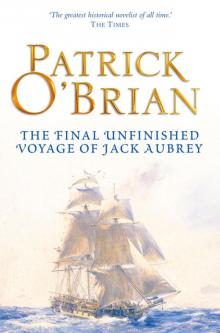 The Final Unfinished Voyage of Jack Aubrey
The Final Unfinished Voyage of Jack Aubrey The Rendezvous and Other Stories
The Rendezvous and Other Stories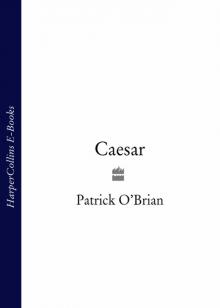 Caesar: The Life Story of a Panda-Leopard
Caesar: The Life Story of a Panda-Leopard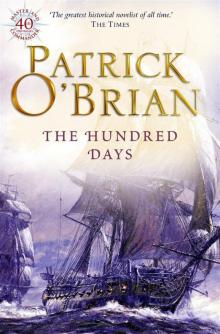 The Hundred Days
The Hundred Days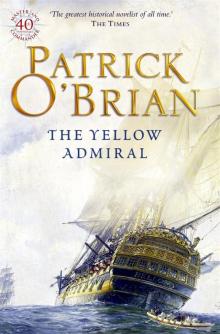 The Yellow Admiral
The Yellow Admiral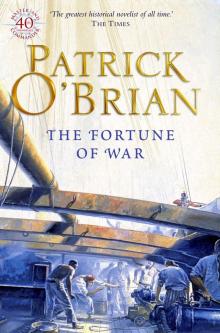 The Fortune of War
The Fortune of War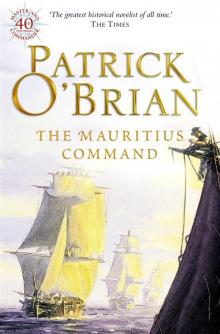 The Mauritius Command
The Mauritius Command Beasts Royal: Twelve Tales of Adventure
Beasts Royal: Twelve Tales of Adventure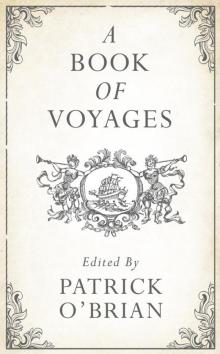 A Book of Voyages
A Book of Voyages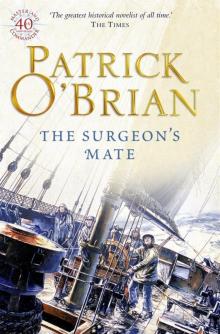 The Surgeon's Mate
The Surgeon's Mate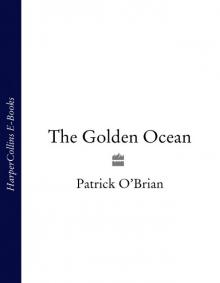 The Golden Ocean
The Golden Ocean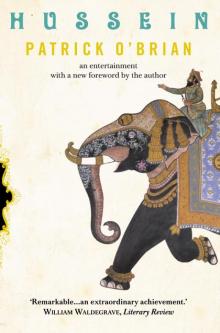 Hussein: An Entertainment
Hussein: An Entertainment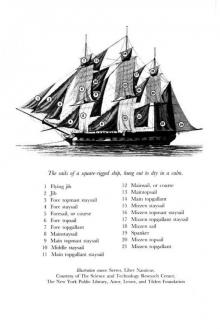 H.M.S. Surprise
H.M.S. Surprise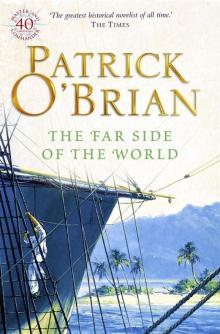 The Far Side of the World
The Far Side of the World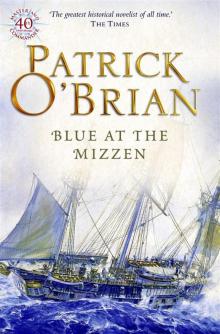 Blue at the Mizzen
Blue at the Mizzen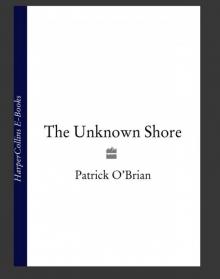 The Unknown Shore
The Unknown Shore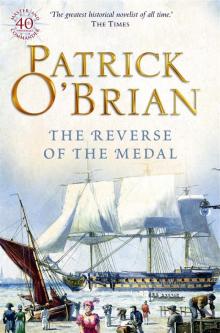 The Reverse of the Medal
The Reverse of the Medal Testimonies
Testimonies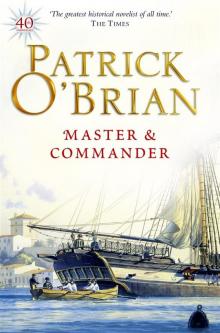 Master and Commander
Master and Commander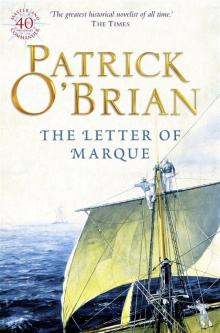 The Letter of Marque
The Letter of Marque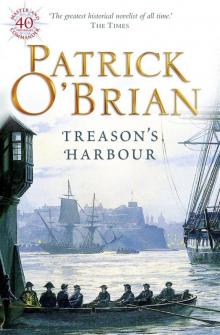 Treason's Harbour
Treason's Harbour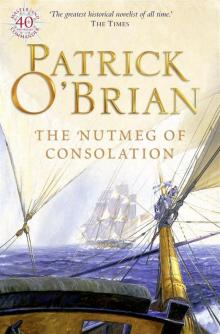 The Nutmeg of Consolation
The Nutmeg of Consolation 21: The Final Unfinished Voyage of Jack Aubrey
21: The Final Unfinished Voyage of Jack Aubrey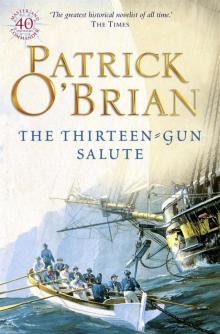 The Thirteen-Gun Salute
The Thirteen-Gun Salute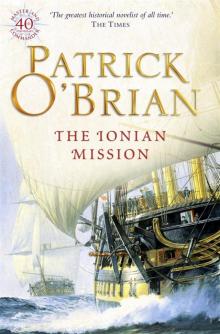 The Ionian Mission
The Ionian Mission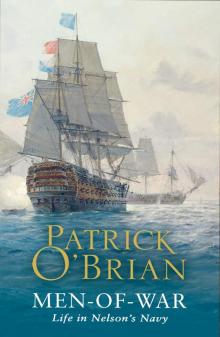 Men-of-War
Men-of-War The Commodore
The Commodore The Catalans
The Catalans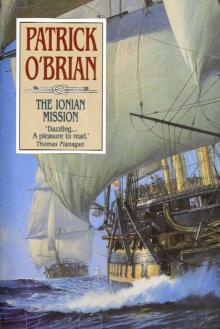 Aub-Mat 08 - The Ionian Mission
Aub-Mat 08 - The Ionian Mission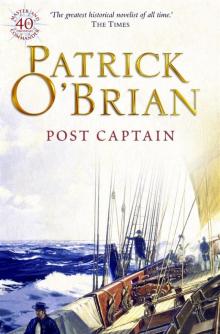 Post Captain
Post Captain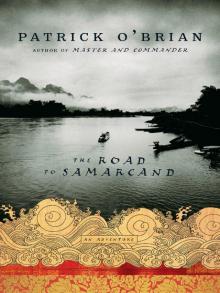 The Road to Samarcand
The Road to Samarcand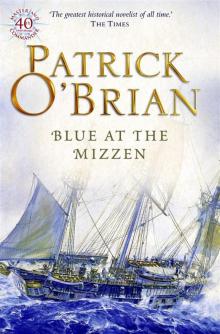 Book 20 - Blue At The Mizzen
Book 20 - Blue At The Mizzen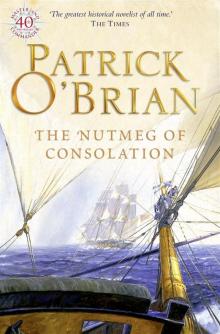 Book 14 - The Nutmeg Of Consolation
Book 14 - The Nutmeg Of Consolation Caesar
Caesar The Wine-Dark Sea
The Wine-Dark Sea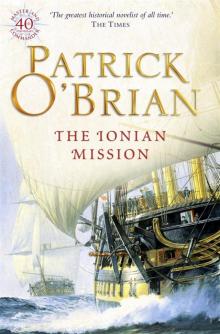 Book 8 - The Ionian Mission
Book 8 - The Ionian Mission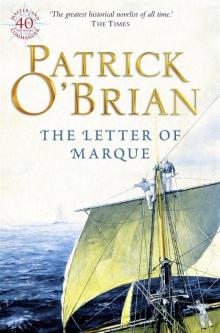 Book 12 - The Letter of Marque
Book 12 - The Letter of Marque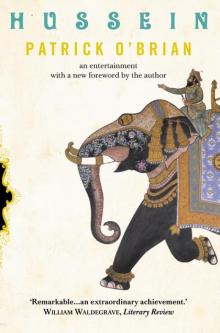 Hussein
Hussein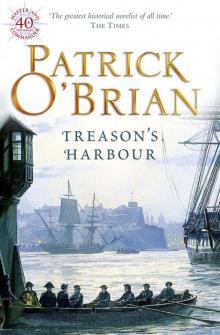 Book 9 - Treason's Harbour
Book 9 - Treason's Harbour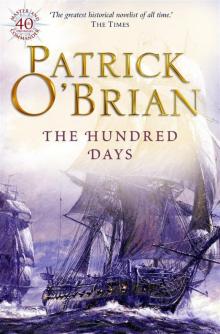 Book 19 - The Hundred Days
Book 19 - The Hundred Days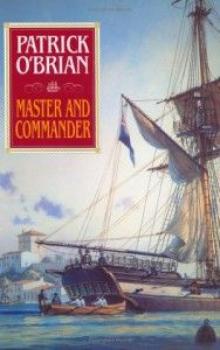 Master & Commander a-1
Master & Commander a-1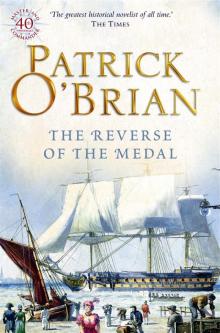 Book 11 - The Reverse Of The Medal
Book 11 - The Reverse Of The Medal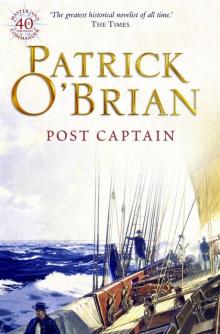 Book 2 - Post Captain
Book 2 - Post Captain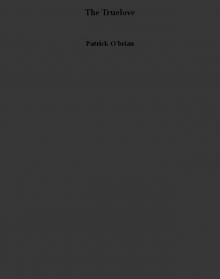 The Truelove
The Truelove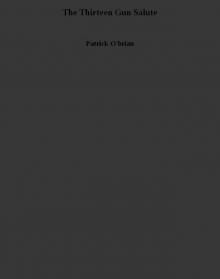 The Thirteen Gun Salute
The Thirteen Gun Salute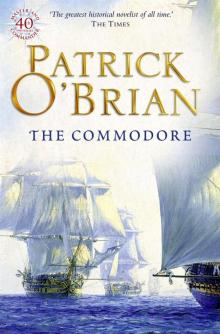 Book 17 - The Commodore
Book 17 - The Commodore The Final, Unfinished Voyage of Jack Aubrey
The Final, Unfinished Voyage of Jack Aubrey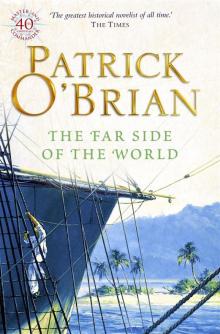 Book 10 - The Far Side Of The World
Book 10 - The Far Side Of The World Book 5 - Desolation Island
Book 5 - Desolation Island Beasts Royal
Beasts Royal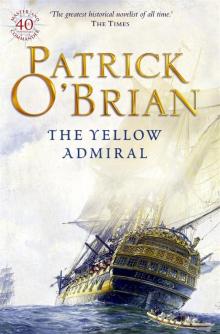 Book 18 - The Yellow Admiral
Book 18 - The Yellow Admiral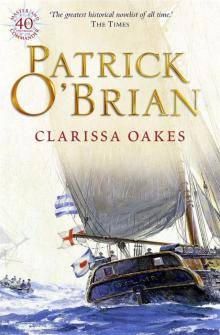 Book 15 - Clarissa Oakes
Book 15 - Clarissa Oakes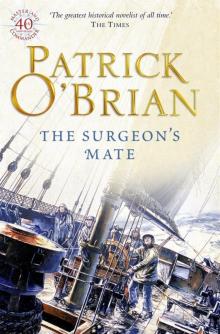 Book 7 - The Surgeon's Mate
Book 7 - The Surgeon's Mate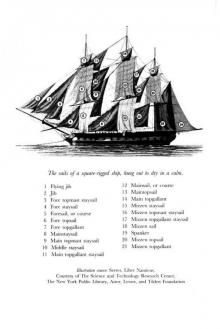 Book 3 - H.M.S. Surprise
Book 3 - H.M.S. Surprise Desolation island
Desolation island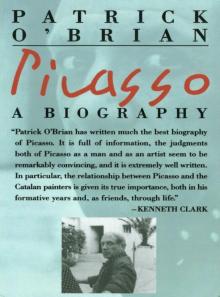 Picasso: A Biography
Picasso: A Biography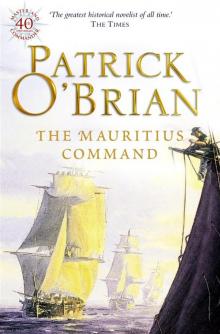 Book 4 - The Mauritius Command
Book 4 - The Mauritius Command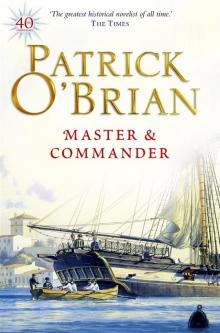 Book 1 - Master & Commander
Book 1 - Master & Commander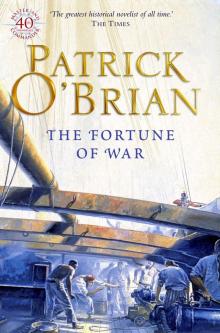 Book 6 - The Fortune Of War
Book 6 - The Fortune Of War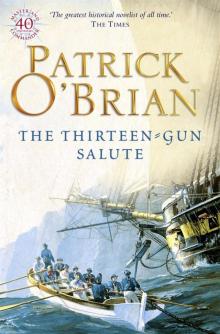 Book 13 - The Thirteen-Gun Salute
Book 13 - The Thirteen-Gun Salute Book 16 - The Wine-Dark Sea
Book 16 - The Wine-Dark Sea